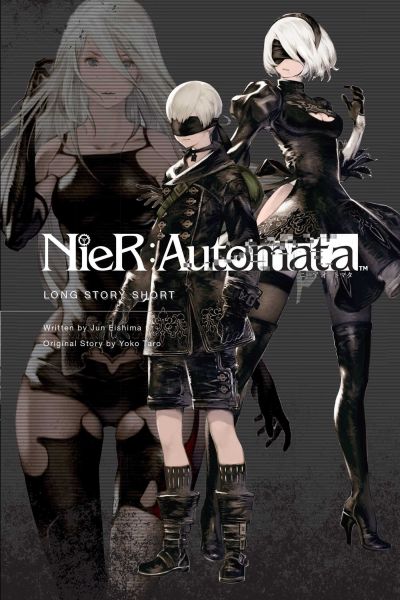And Then Marched Under a Chair
NieR: Automata: Long Story Short
By Jun Eishima & Yoko Taro

24 Oct, 2018
0 comments
2017’s NieR: Automata: Long Story Short is Jun Eishima’s novelization of Square Enix’s computer game of the same name. The original story is by Yoko Taro. Translation is by Shota Okui.
Seven thousand years ago, aliens conquered the Earth, or rather, their Machines conquered the Earth. Humanity’s last refuge is the Moon. Just as the aliens act through their artificial servants, so too has humanity left the war for Earth to their creations, the YoHRa androids. Between android and Machine, there can be no peace.
Androids can be destroyed (for the moment), but they cannot be killed. Their memories can be recorded and loaded into a new chassis. There is not much hope that new generations might forget the old grudges, as the old generations will never vanish. The Machines are presumably the slaves of their programming, in no sense intelligent, so there’s no hope of progress on that front as well.
Or so it seems
Androids 2B and 9S spend their incarnations confronting and destroying (or being destroyed by) alien war Machines. On their most recent foray, they note an extraordinary phenomenon: some Machines seem to be trying to speak to them. At first, this is interpreted as mindless parroting of human language, or perhaps a gambit to gain a momentarily advantage over the androids. It is not.
A small group of Machines led by a certain Pascal have turned their back on the endless, pointless war. This makes them new targets for the roving war Machines. Hence there is a certain sense to an alliance with the androids. The androids, approached, resist. They are perplexed by the thinking machines and find the idea that Machines could be friends and allies almost inconceivable.
There is a second unexpected development: a new kind of Machine has appeared. Adam and its spawn Eve look human. They are curious about humans, but cannot reach them. They attempt to forge an alliance with the human-like androids 2B and 9S and are rebuffed.
But the failed negotiations reveal something astounding: the aliens who ordered the invasion of Earth are long dead, slain by their own highly evolved Machines.
Does the war now have any point?
Major as this is, it’s not the last disturbing revelation.
~oOo~
Of course it is not quite true that the androids are immortal. The backups are not updated in real time, so each time 2B or 9S are destroyed, they lose everything that they experienced after the most recent backup. This turns out to be a significant plot point.
I am not exactly a connoisseur of fine prose, so it’s notable that I find the prose in this book clunky enough to be distracting. The text is also booby-trapped with typos. For instance, 9S becomes 9B on page 33. It’s not clear whether this is a problem in the original text or whether it is due to a hasty translation. Or both; I suspect that this is an all-too-faithful translation of hastily written book.
I have not played the computer game on which this is based, so I cannot judge if this is an accurate rendition of the gameplay experience. But given that the other game-to-book novels I’ve read have been mediocre to dire, and that the game must be popular to have inspired a spin-off, I suspect that this is an inherent defect in the genre. It must be close to impossible to translate an interactive experience to a fixed form like a book or a film.
Comments are currently not working. Please comment at Dreamwidth.
NieR: Automata: Long Story Short is available here (Amazon) and here (Chapters-Indigo).
